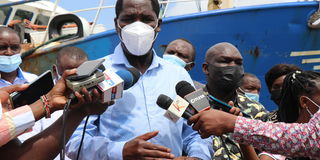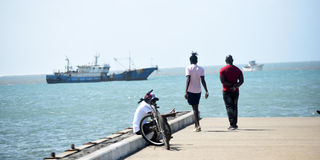State to pay Sh16m ocean surveillance debt this week - Munya

Agriculture, Livestock, and Fisheries Cabinet Secretary Peter Munya briefing the press in Mombasa on the status of the fisheries sector in the Indian Ocean. He said the government pay the Sh16 million debt, subscription fees for Indian Ocean surveillance as he admitted the existence of foreign vessels fishing in the Kenyan exclusive economic zones
The government will this week pay Sh16 million it owes for ocean surveillance work, as officials acknowledged that foreign vessels are fishing in Kenya’s exclusive economic zones.
For the past eight months, Kenya had failed to pay subscription fees to a surveillance firm and was unable to monitor and intercept foreign ships fishing in its territorial waters in the Indian Ocean.
The Vessel Monitoring System (VMS) programme is operated by Collecte Localisation Satellites, a French company that has provided satellite data to Kenya for years.

Chinese fishing boats tied to fishing trawlers at Malindi Beach in Kilifi County in this photo taken on July 19, 2021.
On Wednesday, Agriculture, Livestock, and Fisheries Cabinet Secretary Peter Munya assured stakeholders that the government will pay the debt and resume its operations to monitor its deep waters against incursions.
“Sixteen million shillings is little money. We will clear the debt. Those vessels that are here are licensed to fish but of course, there could be poachers, foreign criminals doing that. We cannot rule out that possibility,” Mr Munya said during a press briefing at the Liwatoni Fishing Complex in Mombasa.
He acknowledged that Kenya lacks the capacity to police its deep waters.
“But that is why we are building our own local capacity to police our waters to eradicate illegal fishing. The government has made strides in the short period,” he said.
“We are training officers… we just need more equipment to deal with the challenges.”
But Mr Munya denied reports that illegal trawlers were spotted fishing in Lamu and Kilifi counties.
He said the trawlers that were spotted in shallow waters were licensed.
“If it were true, officers from the Kenya Coast Guard Service could have already taken action. There could be illegal foreign vessels but in the deep sea, not shallow waters. The locals might have spotted those that have been licensed,” he said.

Chinese fishing boats tied to trawlers at Malindi Beach in Kilifi County on July 2021.
There are criteria, processes and standards for licensing foreign fishing vessels, he said.
“Don’t bother about those that have been licensed because they have gone through the licensing process. We should worry about the foreign illegal vessels that do not land any taxes, jobs and resources.”
The payment to the surveillance company will be cleared today or tomorrow, said Fisheries Director-General Daniel Mungai.
“The Sh16 million debt is already in the process of being cleared. The payment voucher is being processed either today or tomorrow. We will now start surveying our deep waters,” he said.
Collecte Localisation Satellites (CLS) says it is a pioneer provider of monitoring and surveillance solutions. It says on its website that it is an exclusive provider of Argos environmental data.
CLS works in sustainable fisheries management, environmental monitoring, maritime surveillance, fleet management, and energy and mining. It processes environmental data and positions from 80,000 beacons per month, and ocean and inland waters observations. It also monitors land and sea activities by satellite.
But because of a financial crunch at the Fisheries, Monitoring, Control, and Surveillance Centre at the Kenya Coast Guard Service (KCGS) in Mombasa, Kenya could not monitor its waters in the exclusive economic zone, exposing its resources to exploitation by foreigners.
“The VMS is not operational because of (an unpaid) Sh16 million subscription fee for maintenance,” revealed the National Assembly’s Committee on Agriculture.
Kenya has been monitoring its waters using VMS and its only ship the MV Doria, as well as with assistance from other countries. But with the system failing and a lack of funds to operate the Doria, the country relies on other countries for monitoring.
The Doria is used by KCGS to monitor the country’s territory along the Indian Ocean. It was commissioned by President Uhuru Kenyatta in Mombasa in 2018.
But Kenya needs Sh1 million a day to operate the Doria.
Without surveillance, the committee warned, Kenya might be losing its fish to foreign trawlers.
Kenya’s foreign fishing licensing has always been shrouded in secrecy, with efforts by the Nation to get a look at the number of vessels permitted by the government into the fishing zone thwarted several times by the Fisheries department and senior maritime officials.
Between May and August 1, the Nation, through the Global Fish Watch tracker site, managed to compile more than 230 fishing vessels undertaking deep sea fishing in Kenyan waters.
Most of these vessels are foreign-owned, with China, Seychelles, Italy, Taiwan, and Hong Kong-flagged vessels appearing multiple times on the tracking site, recording more than 50,000 fishing hours in Kenyan waters.
In 2020, seven Kenyan-flagged and Chinese-owned and operated fishing vessels were authorised by the Indian Ocean Tuna Commission to fish in the Ocean from January 1, 2021 to December 31, 2031.
This story is part of a Nation.Africa reporting series on the state of the fishing sector at the Coast region. Also read:





